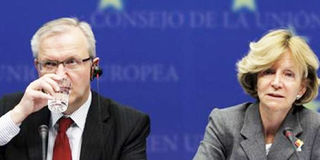The long road to harmony for European Union

European Union Economic and Monetary Affairs Commissioner Olli Rehn (L) and Spain's Economy Minister Elena Salgado (R), whose country currently holds the rotating Presidency of EU, address a news conference at the end of a European finance ministers meeting at the EU Council in Brussels, May 10, 2010. Photo/REUTERS
On Thursday, East Africa Community takes the first step towards achieving a single market where human, capital, labour and goods and services, will move unrestricted within the region.
As this happens, member states may well look at the European Union, which has had a single market running for the last 17 years, for lessons.
In a special feature in 2007 to mark the EU 50th anniversary since the signing of the founding Treaty of Rome in 1957 by the first six members of the EU, the union cited many of the benefits the common market had brought. First, though, the journey travelled.
The core
“The single market is the core of today’s union. Yet getting it up and running took seven years. EU member states agreed on the common market concept in 1993.
“It took hundreds of laws to clear away the technical, regulatory, legal and bureaucratic barriers opening up the EU to a single market with unrestricted access to nearly 500 million consumers.”
The end product has been a seamless integration of the markets, one where there is no barrier to trade or to movement of labour, capital and is competition-free.
“Most households in Europe are free to choose their electricity supplier.”
And skilled professionals can work anywhere in the EU.
In the region, 84 per cent of EU citizens consider an opportunity to study abroad as positive with over 1.5 million young people completing part of their studies in another member state.
While in East Africa there is apprehension on what the implementation of the protocol would portend for business, EU says the benefits outweigh the risks.
The implementation of the single market, EU says, had by 2007 generated more than Sh100 trillion (€1 trillion) in extra wealth while creating over 2.75 million jobs.
“Open competition has forced the mobile companies to slash phone calls to a fraction of what the companies charged 10 years ago.
“Many air fares in Europe have fallen significantly and new routes have opened. Households and businesses are now able to choose who supplies them with electricity and gas,” said the feature.
Border control
Another major score for EU common market is that there are no border controls when travelling by land between 22 member states, only five nations have retained national border controls for travel.
“It is obvious that the common market was not an end in itself, but a means to achieve economic and political goals,” EU says.
EAC member states might have put pen to paper in record time, but as EU history shows for the individual markets to integrate into one, it will take time and more negotiations.




